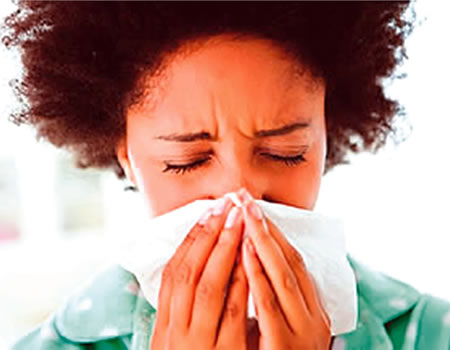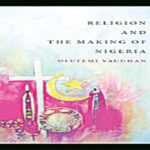We all know what harmattan is, that dry, windy, weather that comes with cold and lots of dust that leaves many people coughing, sneezing or with a runny nose. Also, studies have shown that some micro-organisms that cause diseases increase during harmattan period.
Undoubtedly, there is no season of the year that does not come without affecting people’s lives either positively or negatively. But experts say that the skin, the eyes and the respiratory tract are the most vulnerable to these adverse effects of harmattan.
Harmattan triggers many diseases
According to Dr Olanisun Adewole, a chest physician at the Obafemi Awolowo University Teaching Hospitals Complex (OAUTH), Ile Ife, Osun State, the likelihood of an asthma exacerbation during harmattan is higher due to the cold, high level of dust and low humidity.
Dr Adewole said the risk of a respiratory tract infection due to viruses is also higher due to a combination of cold, infection, dust and air pollution from man’s activities such as bush burning.
Nose, skin, eye more vulnerable to harmattan
Professor of Public Health in the Department of Epidermiology and Community Health, University of Ilorin, Ilorin, Tanimola Akande said the skin, eye, nose are more vulnerable to the effects of harmattan and as such an increase in the incidence in diseases such as cold, cough, and asthma at the period.
“These are exposed parts of the body. During harmattan, they are not as moist as they would naturally be and as such easily bruised, so therefore more susceptible to all these infections,” he declared.
For instance, the eyes are exposed to the dust particles carried by the dry, cold and dusty wind leading to itching, redness, and foreign body sensation. Allergic eye diseases are also common.
The skin is usually dry with accompanying cracking of the lips, sole of the feet and even the skin itself. The body extremities such as the hands and feet are sometimes too cold to generate unpleasant symptoms.
Joint and nose bleeds, a problem
He also raised the possibility of people experiencing joint pains and nose bleeds. Nose bleeds because of its dry mucus lining and a lot of nose picking that leaves some blood vessels injured. Also, with violent sneezing, some people coming down with nose bleeding.
“Moreover, the harmattan also triggers sickle cell crisis in those with sickle cell anaemia. Oxygen in blood is usually reduced in extremes of temperatures, like cold. Thus, patients with Sickle cell anaemia need be kept warm as much as possible during harmattan to prevent a crisis,” he added.
That the symptoms of arthritis such as the pain and swelling in their joints worsen with cold seasons, Dr Michael Okunola, a consultant, orthopaedics and trauma surgeon, University College Hospital (UCH), Ibadan linked to reduction in level of activity during cold seasons.
He added, “If there are instances when you do not move your joints regularly, the symptoms tend to accentuate the pain and stiffness. One of the ways of reducing symptoms is to keep moving your joints and that is why regular exercise is advocated for persons with arthritis.”
Ultimately, “the fact that when it is cold or raining outside, people tend to stay indoors more and the level of activity is reduced allows their minds and attention to be more on the pain and stiffness in their limbs. So, they may feel that their joint is giving them more pains,” he added.
Harmattan, forerunner of meningitis
Experts also say that the epidemic of meningococcal meningitis usually experience between February and May in the ‘meningitis belt’, northern Nigeria inclusive, is also an aftermath of harmattan.
Persons with hypertension and heart conditions also need to adhere to their medications and keep warm during this season. Professor Rassaq Adebayo, also a consultant cardiologist at OAUTH Complex, Ife-Ife, Osun State stated that harmattan can worsen hypertension and heart conditions.
Adebayo, Chairman, Medical and Dental Consultants of Nigeria, OAUTH complex, Ile Ife, stated that the season is usually worrisome to cardiologists because harmattan has both direct and indirect ways of worsening heart disease.
Worsens heart condition, too
The expert said studies carried out in Jos found that during the harmattan period, blood pressure tend to increase the more and more people with heart conditions develop heart attack and stroke.
Professor Adebayo said people with heart problems tend to get sick because the high level of atmospheric dust pollution and infections like upper respiratory infections that can cause inflammation in the heart during this period.
According to him: “when experts compared admission for heart failure and hypertension during harmattan with that in other seasons at Jos, there were more hospital admission for heart failure and hypertension during harmattan.
“Unlike others that are able to cope with inhaled dust, the body’s reaction to dust in persons with heart problems worsens their health.”
Dust free environment is key
But, Professor Akande suggested that people could wear nose masks in very dusty areas or stay indoors as much as possible to prevent inhaling dust as well as ensure they increase their intake of fruits and vegetables as well as eat hot foods to remain healthy during Harmattan.
Maintaining a dust-free home environment, he said is also important to minimise negative effects of harmattan. such as asthma. Wiping windows and fans with wet rags as well as servicing air-conditioners would also avoid the season’s induced symptoms.
Alcohol does not drive off cold
The public health expert, however, discourages smoking or intake of alcohol to stay warm during this season, saying that it is merely an excuse to either drink or smoke.
He said, “The person will be doing more harm than good by using alcohol and or smoking to take care of cold. Cigarette is dangerous to health. The little heat that comes from the tip of the cigarette is all that does it.
“The heat that goes inside the body when smoking is too little to warming up. It is more of people taking in stimulants. That is not warming up. It is the same thing with alcohol. It is not good for them at all.
“Scientifically when those who use alcohol or smoking to get warm are compared with those who do not, they are not better than off. It is merely an excuse to ward off cold.”
The U.S. Centres for Disease Control and Prevention stated that the false sense of warmth from alcohol does not translate to overall body temperature.
Alcohol may make the skin feel warm, but this apparent heat wave is deceptive. A nip or two actually causes the blood vessels to dilate, moving warm blood closer to the surface of the skin, and giving a temporary warmness.
This is not the only bad thing about drinking alcohol in the cold. The Army Research Institute of Environmental Medicine, in a study said drinking alcohol in chilly weather also reduces the body’s ability and tendency to shiver, taking away yet another method the body uses to help keep warm when it is cold.
Meanwhile, the use of neck scarf to remain warm or as a nose cover, President, Nigerian Thoracic Society, Professor Etete Peter said is also helpful in very cold, dusty environment to prevent intake of dusts that can trigger off allergic reactions. He also recommended inhalation of hot stream to clear off stuffy airway.






